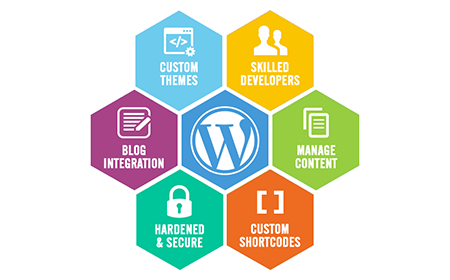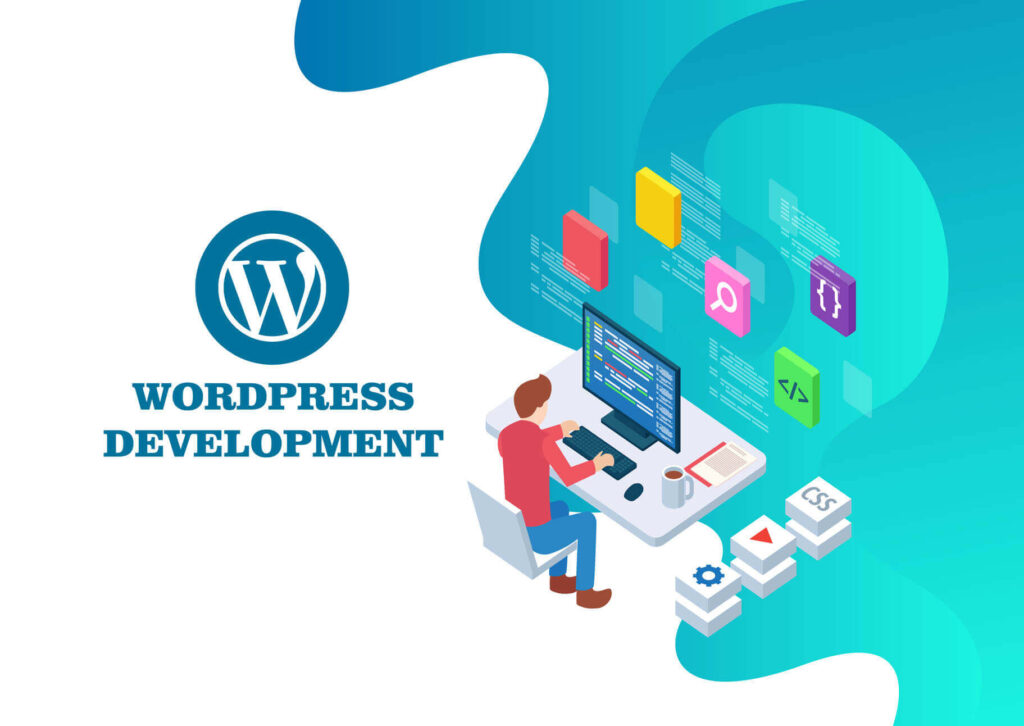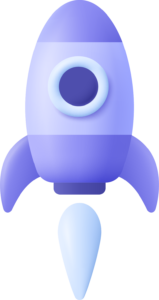Understanding WordPress Development
Gaining an understanding of WordPress development is learning how adaptable it is for building and maintaining websites. Popular for its huge plugin ecosystem and easy-to-use interface, WordPress is an open-source content management system (CMS) that is used extensively. The following are five essential concepts for WordPress development to grasp:
- Ease of Use
- Flexibility and Customization
- SEO-Friendly
- Scalability
- Security Features
Dlite Info Tech
Why WordPress Development is Crucial for Modern Web Applications

Why WordPress Development is Crucial for Modern Web Applications
WordPress development is crucial for modern web applications due to its versatile capabilities and widespread adoption. As an open-source Content Management System (CMS), WordPress offers a user-friendly interface, extensive customization options, and a vast ecosystem of themes and plugins. These features make it an ideal choice for building websites ranging from blogs and small business sites to large-scale enterprise solutions.
Dlite Info Tech Craft Beautiful Websites That Attract And Convert!
We excel in crafting compelling websites that not only capture attention but also yield outcomes. With a team of proficient designers and developers, we’re committed to elevating your online presence into a stunning showcase. We grasp the significance of crafting not only aesthetically pleasing but also practical websites that captivate and convert visitors into devoted patrons.

what you get
Key Benefits of WordPress Development
WordPress development offers a plethora of benefits that make it a preferred choice for creating websites and web applications across various industries. Here are five key benefits:
SEO-Friendliness
SEO-Friendly Permalinks: WordPress allows users to create custom, SEO-friendly URLs (permalinks) for posts and pages. This feature enables the inclusion of keywords and relevant terms in URLs, improving the chances of higher search engine rankings.
Optimized Content Management: WordPress provides a straightforward content management system that encourages proper use of headings (H1, H2, etc.), image alt tags, and meta descriptions. These elements are crucial for on-page SEO optimization, helping search engines understand and index content effectively.
Mobile Responsiveness: Most modern WordPress themes are designed to be mobile-responsive, meaning they adapt and display content correctly across various devices (desktops, tablets, smartphones). Mobile responsiveness is a key ranking factor in search engine algorithms, positively impacting SEO performance.
SEO Plugins: WordPress offers a variety of SEO plugins, such as Yoast SEO and All in One SEO Pack, which enhance website optimization capabilities. These plugins provide tools for keyword optimization, XML sitemap generation, social media integration, and other SEO tasks, making it easier for users to improve their site’s search engine visibility.
Scalability
Performance Optimization: WordPress includes built-in caching mechanisms and supports content delivery networks (CDNs) to optimize website performance. These tools help reduce load times and handle increased traffic efficiently, ensuring a seamless user experience as traffic grows.
Scalable Infrastructure: WordPress can be deployed on scalable cloud hosting platforms such as AWS (Amazon Web Services), Google Cloud Platform, and others. This allows websites to scale resources (CPU, RAM, storage) dynamically based on traffic fluctuations and business growth without downtime.
Plugin and Theme Ecosystem: WordPress offers a vast ecosystem of plugins and themes that extend functionality and enhance scalability. Plugins can add features like e-commerce capabilities, membership systems, and more, while themes provide customizable designs that adapt to growing content and user needs.
Multi-Site Capabilities: WordPress Multisite allows users to create a network of multiple websites from a single WordPress installation. This feature is ideal for businesses, educational institutions, and large organizations that manage multiple websites with shared resources, user management, and updates.
Vibrant Community and Support
Active Community Engagement: WordPress boasts a large and active community of developers, designers, bloggers, and enthusiasts who contribute to its growth and development. This community actively participates in forums, meetups, and online discussions, sharing knowledge, troubleshooting issues, and providing support to users worldwide.
Extensive Documentation and Resources: WordPress offers comprehensive documentation, tutorials, and user guides that cater to users of all skill levels. These resources cover topics ranging from basic setup and customization to advanced development techniques and troubleshooting, empowering users to maximize their WordPress experience.
Plugin and Theme Development: The WordPress community is rich in plugin and theme developers who contribute to the ecosystem by creating and maintaining thousands of plugins and themes. These extensions enhance WordPress functionality, offering solutions for e-commerce, SEO, security, and more, tailored to diverse user needs.
Accessibility and Global Reach: WordPress’s global community ensures accessibility for users across different languages, cultures, and regions. Localized versions of WordPress, along with translation efforts and community-driven initiatives, make the platform accessible and adaptable to various international markets and user preferences.
Ease of Use
Intuitive Dashboard: WordPress provides a user-friendly dashboard that allows users to manage content, customize settings, and administer their websites easily. The interface is designed for simplicity, making it accessible even for users with limited technical expertise.
Content Management: Adding and editing content in WordPress is straightforward, with a built-in editor that resembles word processing software. Users can create posts, pages, and multimedia content (images, videos) with ease, formatting text and adding media through a user-friendly interface.
Customization Options: WordPress offers a wide range of customizable themes and plugins that enable users to personalize the appearance and functionality of their websites. Themes control the design and layout, while plugins add specific features such as contact forms, galleries, and SEO tools, all configurable through the dashboard.
User Roles and Permissions: WordPress includes a role-based user management system that allows site owners to assign specific roles (Administrator, Editor, Author, Contributor, Subscriber) to users. Each role has predefined permissions, ensuring secure access control and collaboration on content management tasks.
Flexibility and Customization
Themes and Templates: WordPress offers a vast library of themes that control the appearance and layout of a website. Users can choose from free and premium themes, each offering different styles and customization options to match their brand identity and design preferences.
Plugins for Extended Functionality: WordPress boasts a rich ecosystem of plugins that extend the core functionality of the platform. Users can easily add features such as e-commerce, SEO optimization, social media integration, contact forms, and more without needing to code. Plugins are available for various needs and can be installed and activated directly from the WordPress dashboard.
Customizable Widgets and Menus: WordPress allows users to customize their website’s sidebar content and navigation menus through widgets and custom menus. Widgets can be added, removed, or rearranged to display different types of content (e.g., recent posts, categories, tags) in the sidebar or footer areas. Custom menus offer flexibility in organizing navigation links according to the site’s structure and hierarchy.
Page Builders and Block Editors: WordPress includes block-based editors and page builders like Gutenberg and popular plugins such as Elementor and WPBakery Page Builder. These tools enable users to create complex page layouts and designs using drag-and-drop functionality, pre-designed blocks, and customizable templates. They provide flexibility in designing unique and visually appealing content without requiring coding skills.
Creating Success
Why WordPress Development Services Excel in Today's Market
Versatility and Scalability
WordPress offers a versatile platform suitable for a wide range of websites, from personal blogs to large enterprise portals.
Extensive Ecosystem of Themes and Plugins
WordPress boasts a vast ecosystem of themes and plugins that extend its core functionality.
User-Friendly Content Management
WordPress is renowned for its intuitive content management system (CMS), which simplifies content creation, editing, and publishing.
“Numerique PPC service is light years ahead of the competition because of their intelligent, specialized and courteous account managers.”
Director of Marketing

WordPress Development: Demonstrating Effective Solutions with Reflective Success
WordPress development has established itself as a versatile content management system (CMS) renowned for its ability to create and manage websites efficiently. Embracing WordPress means adopting a platform that prioritizes user-friendliness, flexibility, and extensibility—all essential aspects for modern web applications.
Results-Driven
Client-Centric
Innovative Techniques
Client Success Stories
FAQ
FAQs about WordPress Development
WordPress is a popular open-source content management system (CMS) that allows users to create websites, blogs, and online stores. It offers a user-friendly interface and extensive customization options through themes and plugins.
WordPress can be customized by using themes to change the design and layout of a website. Additionally, plugins extend functionality by adding features like contact forms, SEO optimization, e-commerce capabilities, and more.
Yes, WordPress is inherently SEO-friendly. It supports clean permalink structures, customizable meta tags, and integration with SEO plugins like Yoast SEO. These tools help improve website visibility and search engine rankings.
WordPress has a large and active community of developers, designers, and users who contribute to its ecosystem. Resources include forums, documentation, online tutorials, and a repository of free and premium themes/plugins, providing support and updates for WordPress development.


